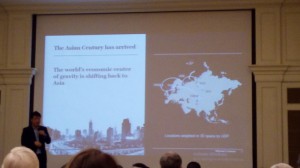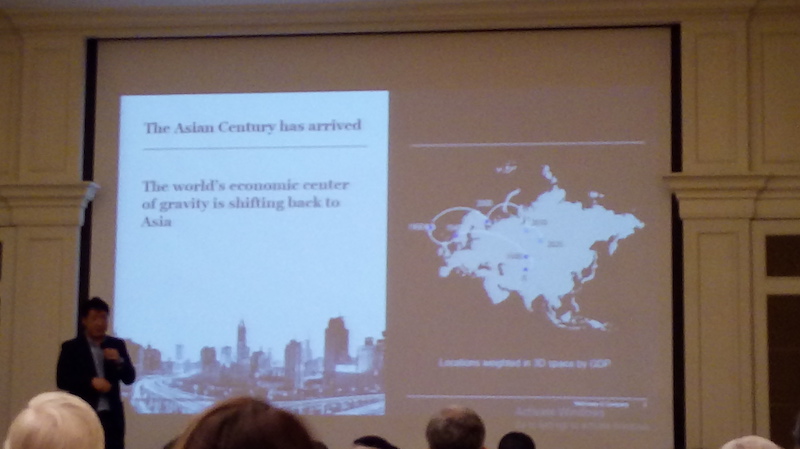 In 2040, Asia is expected to return to being the center of gravity of the world economy. This was conveyed by a researcher from McKinsey, Jeongmin Seong, in one of the sessions at the annual Asia Pacific think tank conference held in Bangkok in mid-November. In 2040, it is estimated that Asian consumption will reach 40 percent of total global consumption, and Asia’s Gross Domestic Product (GDP) will reach 52 percent of global GDP.
In 2040, Asia is expected to return to being the center of gravity of the world economy. This was conveyed by a researcher from McKinsey, Jeongmin Seong, in one of the sessions at the annual Asia Pacific think tank conference held in Bangkok in mid-November. In 2040, it is estimated that Asian consumption will reach 40 percent of total global consumption, and Asia’s Gross Domestic Product (GDP) will reach 52 percent of global GDP.
According to Seong, the return of world economic gravity to Asia is because currently Asia has become four clusters, each of which has advantages and complements one another. Of these four clusters, the first is China, which has the ability to act as an anchor and driver of trade networks between countries in Asia. The second cluster is Advanced Asia, namely Japan and South Korea, as technology pioneers and capital providers. The third cluster is Emerging Asia, namely countries in Southeast Asia that are economically integrated and have diverse cultures. And the fourth cluster is India and border Asian countries, which are rapidly making economic leaps.
This conference itself was organized by the Think Tank and Civil Society Program (TTCSP), an institution under The Lauder Institute, University of Pennsylvania, which routinely ranks think tank institutions in the whole world. At the conference, PATTIRO was present together with no less than 80 think tanks from countries in Asia and Africa. Apart from that, there were also representatives of think tank institutions from Italy, Kenya, Germany, New Zealand and Australia. TTCSP Director James McGann reminded the important role of think tanks in facing various challenges that arise, along with strengthening economic growth. According to him, one of the challenges that will be faced is increasing unemployment caused by the rapid development of technology which will replace human labor.
To answer this challenge, the conference participants discussed the importance of think tanks to provide recommendations to the government to issue policies that encourage an increase in the ability of its citizens to adapt to technology. In this way, technology is no longer a competitor, but can be used to support their work in everyday life. Apart from that, technology is not only used by urban communities, but can also be of value to communities in rural areas. As stated by participants from a think tank from India, the National Institute for Advanced Studies, currently Indian citizens, the majority of whom live in rural areas, are still unable to experience the benefits of technology in their daily lives.
Another challenge that is important for think tanks to address is related to the rise in acts of terrorism. Indirectly, this act of terrorism will threaten democracy which is currently developing in many countries in Asia. Acts of terrorism are often responded to with securitization, namely overcoming terrorism with a military approach. Meanwhile, it is understood that this securitization approach is often contrary to democratic values. A country like Myanmar, for example, which is currently developing towards a democratization process, is forced to use a military approach to prevent acts of terrorism that are suspected to arise from one particular ethnic group. Although it is acknowledged that pluralist values have developed in most regions of the country. It is hoped that the problem of terrorism will not only be the responsibility of one country alone, but needs to be encouraged so that the governments of countries in the region have a joint strategy to overcome it. Synergy between governments of countries in the Asia Pacific region is not only related to terrorism, but is also related to efforts to resolve various disputes, such as the South China Sea dispute, the Korean Peninsula conflict, and the Chinese and American trade war.
Apart from economic issues, terrorism and democracy, the issue of climate change also emerged at the conference. As is known, the global community is now moving together to respond to the phenomenon of climate change which has triggered increased emissions and global warming. The conference participants mostly highlighted the importance of think tanks thinking about solutions to replace fossil energy with new renewable energy. Almost no participants raised the issue of the importance of forests in the context of climate change. Regarding forests and climate change issues, in one conference session, PATTIRO proposed a movement from a think tank to encourage the governments of countries in the Asia Pacific to collaborate in protecting forests. One thing that needs to be encouraged is, for example, joint management of forest fires, as well as efforts to prevent forest conversion, which is currently dominated by palm oil companies.(Bejo Untung)





